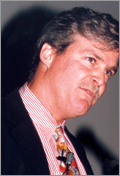194th ECS Meeting | Boston, MA | Nov. 2, 1998
The Beginning of the End of Science
The Meeting opened with the Plenary Lecture delivered by John Horgan, a freelance science writer, who presented the premises of his national bestseller book, “The End of Science,” published in 1996. Mr. Horgan warned the room packed full of conference attendees that his talk has not been greeted warmly by scientific audiences. A lively debate with Horgan did follow his address and continued well into the coffee break. The main idea he presented was that all the major, pure, scientific discoveries have been made and only incremental advances to them are to be made in the future. The list of “surprising” discoveries that have been made include the theory of relativity, Darwinian natural selection, DNA-based genetics, and quantum mechanics. Horgan stated that these past successes pose a barrier, in that science imposes limits on its own power and helps propound the scientific vision of reality as essentially true. He believes that the more we know of science, the less there is to discover. Now all that scientists are left with is to work out the details. However, some pursue what Horgan called speculative, or “ironic science.” The examples he gave were superstring theory in physics (which is inaccessible to experimental verification), and wormholes in cosmology; theories Horgan thinks are signs of desperation. To support his view of the end of science, Horgan proceeded with a sophist argument defending himself from a list of typical disagreements he has faced with scientists.
“That’s what they thought 100 years ago.” With reference to the discovery of relativity and quantum mechanics, Horgan commented that this was bad I inductive logic and that the question is “when,” not “if,” the era of rapid scientific progress will end.
“Answers will raise new questions.” In Horgan’s view, what will be raised are details and the current picture of science will only be refined; there will always be unanswerable questions.
“Paradigm shift.” Contrary to philosopher Carl Popper’s belief that we can never prove, only disprove, a theory, Horgan stated that we do know that things exist, but that there will be no such paradigm shift in scientific theorizing.
“Extraterrestrial life.” For Horgan it was clear that there is no evidence that life exists beyond earth.
“Chaoplexity gambit.” Chaoplexity is a word coined from a combination of the words “chaos” and “complexity.” Horgan discredited explanations of scientific phenomenon by what he believes are optimistic interpretations of computer results dependent on initial conditions, in which for example, “the flutter of a butterfly wing could cause a monsoon in Bangladesh.”
“Chess metaphor.” For the argument that applied sciences are just at a beginning, Horgan countered with examples of the unfulfilled dreams of inexhaustible fusion energy, immortality, and a cure for cancer (about the latter he noted that the U.S. has spent $35 billion on this “war”).
“What about the human mind?” The knowledge of neuroscience has not aided mental illness, Horgan contended. The drug Prozac has not proved to be better than older drugs or even talk therapy. He noted that even therapies such as lobotomy and shock therapy have come back into use.
“Lack of imagination.” Horgan stated that scientists hope for a huge revelation, but he asked what if there is no big break-through over the horizon? Horgan believes that the success of science will be its undoing.
Horgan ended his talk with thoughts of what our world would be like with the “end of science.” Although others have predicted extremes of a hedonistic “New Polynesia” society intent on only pleasure, to an aggressive society which invents wars for something to do, Horgan believes it will be more of a combination of the two. He ended with the comment, “It won’t be heaven or hell, post-science. But remember we’ll still have sex and beer.”
A short but lively discussion ensued after the talk. Horgan further explained that the limits of science were not only physical, but political and economic. He gave as an example the lack of public support for, and the cancellation of, the building of a superconductor supercollider, a large, costly machine to study particle physics. A question was asked about mathematics: Horgan stated that math was an invention with cognitive limits. He noted that the recent proof of Fermat’s Last Theorem was inaccessible to all but a few scientists, and that math has become divorced from science. Another questioner asked about religion versus science. Horgan believes that religion never went away with scientific discovery, and may even have benefitted from those who view science as cold and bleak. And what do science writers do for a living after with the end of science? Horgan says he’ll continue to write books and give presentations of his views.

